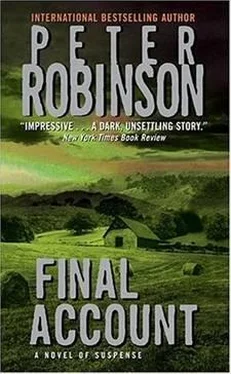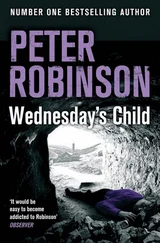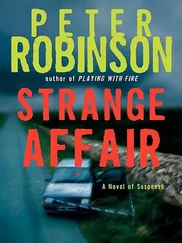“So you invited Clegg over to the Calvert flat to get his fingerprints there? Am I right?”
“Yes. On the Monday. I said I had some business to discuss that couldn’t wait and he came over. I showed him around, had him touch things. I’d cleaned the place thoroughly. Daniel was a touchy-feely kind of person. Anything he saw, he’d pick it up and have a look: compact discs, wallet, credit cards in Calvert’s name, coins, books, you name it. He’d even let his fingers rest on surfaces as if he were claiming them or something. He handled just about everything in the place. I was much more careful to make mine blurred.” Rothwell laughed quietly. “He really was a fool, you know. Every time I got him to help me with something illegal, like setting up the Calvert bank account and credit card, for example, he thought he was getting more power over me .”
“So you must have known we’d find out about the Calvert identity, about Pamela, about Clegg and the money-laundering?”
“Of course. As I said earlier, I had to leave Calvert behind. It was part of my plan that you should find out about him. Another dead end. But please believe me, Pamela wasn’t meant to be a part of it, except maybe to confirm the Calvert identity. I mean, I thought she might get in touch with the police if she saw my picture in the papers. Or someone else might, someone who thought they recognized me. It was meant to confuse you, that’s all. I left a careful trail for you. I thought it led the wrong way. I knew the police would be able to unlock and interpret the data on my computer eventually, that they would realize I’d been laundering money for Martin Churchill. I also left a letter for Daniel Clegg in a locked file. I knew you’d get at that eventually, too.”
“That was one of the things that bothered me,” Banks said. “In retrospect, it was all too easy. And we never found a copy of the letter among his papers. He could have destroyed it, of course, but it was just one of those little niggling details. Lawyers tend to hang onto things.”
“I never sent it,” said Rothwell. “I just created the file so you’d get onto Daniel if you hadn’t already. It was a way of telling you his name, but I couldn’t make it too easy. Then you’d assume he’d had me killed and disappeared with the money.”
“Oh, we did,” said Banks. “We did.”
“Then why are you here?”
“Because I’m a persistent bastard, among other things. There were too many loose ends. They worried me. Two different sets of thugs roaming the country, for a start. They could be explained, of course, but it still seemed odd. And we couldn’t find any trace of Clegg, no matter how hard we tried. His ex-wife said he fancied Tahiti, but we had no luck there. We had no luck anywhere else, either. Of course we didn’t. We were looking for the wrong person. But mostly, I think, it was the connection with Julia that really did you in.”
“How did you find out about her?”
“Pamela Jeffreys mentioned her first. She said she thought you were in love. Just a feeling she had, you understand. Then I began to wonder how it would upset the apple-cart if you fell in love as Robert Calvert . How would you handle it? Then Tom came back from America for your funeral.”
“Ah, Tom. My Achilles heel.”
“Oh, he didn’t realize the significance of it. But you made him angry. He followed you to Leeds once. He saw you have lunch with a woman. Julia Marshall. You didn’t know that, did you? But Tom couldn’t imagine the scale of your plans. He’s just a kid who caught his father with another woman. He was already angry, mixed up and confused at the way you treated him. He was after getting his own back, but what he saw upset him so much that all he could do was keep it to himself.”
“Christ,” he muttered. “I didn’t know that. He didn’t tell Mary?”
“No. He wanted to protect her.”
“My God.” Rothwell ran his hand over the side of his face. “Maybe you think I reacted too harshly, Chief Inspector? I know we’re living in liberal times, where anything goes. I know it’s old-fashioned of me, but I still happen to believe that homosexuality is an aberration, an abomination of nature, and not just an ‘alternative lifestyle,’ as the liberals would have it. And to find out that my own son… ”
“So you decided it would be best to send Tom away?”
“Yes. It seemed best for both of us if he went away, a long way away. He was well provided for. As it turned out, he wanted to go travelling in America and try to get into film school there. By then I knew I had to get away, too, so it seemed best to let him go. At least he had a good chance. I might have abhorred his homosexuality, but I’m not a tyrant. He was still my son, after all.”
“Tom gave us an accurate description of Julia,” Banks went on. “He’s a very observant young man. We ran the artist’s impression in the Yorkshire Post and a woman called Barbara Ledward came forward, a colleague of Julia’s, then Julia’s family. Nobody lives in a vacuum. When we followed up on their phone calls, we found out that Julia had resigned from her teaching job suddenly and told everyone she was going away, that she had a once-in-a-lifetime opportunity abroad but couldn’t divulge the details. She said she’d be in touch, then she simply disappeared about three days before your apparent murder. Her family and friends were worried about her. She didn’t usually behave so irresponsibly. But they didn’t report her as a missing person because she had told them she was going away.
“We might have been a bit slow on the uptake, but we’re not stupid. All Julia’s friends and colleagues mentioned how fascinated she was by the ancient Greeks. She even tried to teach the kids about the classics at school, though I’m told it didn’t go down well with the head. He wanted them to study computers and car maintenance instead. We had to assume you didn’t think we’d find out about Julia. Oh, you might have suspected we’d find out there was someone , but you didn’t think we’d try to find her, did you?”
“No,” said Rothwell. “After all, why should you want to? No more than I thought you would waste time and money doing tests to see if it really was my body in the garage. Another risk. I was clearly dead, executed because of my involvement in international crime. What did it matter if I, or Calvert, had a girlfriend? I never thought for a moment you’d look very closely at the rest of my private life.”
“Then you shouldn’t have revealed the Calvert identity to us,” Banks said. “If it hadn’t been for that, we might have gone on thinking you were a dull, mild-mannered accountant who just happened to get into something beyond his depth. But Calvert showed imagination. Calvert showed a dimension to your character I had to take into account. And I had to ask myself, what if Calvert fell in love?”
“I couldn’t get rid of Calvert,” said Rothwell. “You know that. I didn’t have time. Too many people had seen him. I had to figure out a way to make him work to my advantage quickly. I thought he’d be a dead end.”
“Your mistake. Poor judgment.”
“Obviously. But I had no choice. What else could I do?”
“So how did you handle the killing?”
“Another drink?”
“Please.”
Banks stared out over the pink and purple flowers in the window box at the barren hillside and the blue sea below. Rothwell’s mention of the forensic tests galled him. He knew they should have tried to establish the identity of the deceased beyond doubt. Forensics should have reconstructed the teeth and checked dental records. That was an oversight. It was understandable, given the way Rothwell had apparently been assassinated, and given the state the teeth were in, but it was an oversight, nevertheless.
Читать дальше












